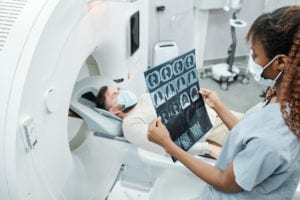
Magnetic resonance imaging (MRI) utilizes a powerful magnetic field and radio waves to capture detailed images of the structures and organs of the human body. MRIs are used to detect signs of aneurysms, strokes, brain tumors, spinal cord injuries, multiple sclerosis, eye or inner ear problems, soft-tissue injuries, and inflammatory conditions, among many other medical problems, which other medical imaging tools are not able to efficiently identify.
If your doctor told you that you need an MRI, here’s what you need to know to make sure you’re adequately prepared for the procedure:
Risks and Contraindications
An MRI scan has no known side effects; however, it has some absolute contraindications. Thus, if you have any of the following medical devices or conditions, you should let your doctor know:
- The cardiac implantable electronic device (e.g. pacemaker)
- Aneurysm clip in the brain
- A hearing device, such as a cochlear implant
- Severe claustrophobia
- Severe renal failure that requires dialysis (the use of certain gadolinium-containing agents is linked to an increased risk of nephrogenic systemic fibrosis)
- Copper intrauterine device (IUD)
What to Expect During Your MRI Appointment
The procedure usually takes approximately 20 to 50 minutes and requires no special preparations. However, you will be instructed to remove your jewelry and eyeglasses, if you’re wearing any. If you’re claustrophobic, you may be given medication to keep you calm throughout the procedure. Your technician will also offer you headphones to muffle the loud, thumping noise from the scanner and administer contrast dye (gadolinium) intravenously to enhance the images.
When you’re comfortably positioned, you will be slowly slidden into a long, capsule-like space that has both ends open, and you will be monitored from another room. You can talk to the technician through a two-way intercom system. They may also instruct you to use the alarm button to prompt them about any discomfort that you may experience at any point during the procedure. It is important that you lie as still as possible. Any movement during this time can affect the quality of the images.
When the procedure is done, you will be told to drink lots of fluids to flush out the contrast dye from your body. If you were not sedated, you can resume your usual day-to-day activities immediately after the procedure; otherwise, you will need some downtime and someone to drive you home.
MRI Facility in Bronx, NY
At Starling Diagnostics, we use 3T MRI technology, which generates a magnetic field that is two times stronger than that of a traditional MRI and allows for the precise and quick detection of the subtlest abnormalities and a much wider variety of medical conditions.
Our radiologists and technicians are dedicated to delivering exceptional patient experience while ensuring high-quality imaging results.
To schedule an MRI appointment, you can either fill out our online form or call us at (718) 319-1610.
